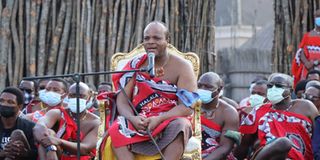Eswatini crisis: Why King Mswati III declined to engage demonstrators

Eswatini’s King Mswati III at an open public meeting known as Sibaya on July 16, 2021.
King Mswati III of Eswatini will only engage Swazis in dialogue to end pro-democracy protests after the Incwala Festival of First Fruits, his government has announced.
The summer festival has already begun and will conclude at the end of January or early February, heralding the beginning of the harvest season.
It is the main ritual of Mswati’s kingship and is regarded as the most important cultural event of Africa’s last absolute monarchy.
The king is the main participant of Incwala and has now entered seclusion in which he is not allowed to meet people as per tradition.
He will only appear in public or participate in public engagements when he disperses his warriors after the first harvest.
Incwala Ceremony
“His Majesty King Mswati III has announced that a process of national dialogue through Sibaya [an open forum discussion] will be initiated after the Incwala Ceremony,” the Eswatini government confirmed on Saturday.
The announcement of the delay in discussions with the public comes a day after King Mswati met Southern African Development Community (SADC) special envoys on Friday.
South African President Cyril Ramaphosa delegated the envoys to Eswatini in his capacity as chair of SADC Organ on Defence, Politics and Security Cooperation.
Chairman of the Eswatini royal executive council Themba Ginindza relayed a message that, during the traditional practice which the king has already retreated to, “His Majesty calls for calm among all emaSwati and an end to all violence as no dialogue can happen while tempers are this high.”
The king called for an open discussion in July during the previous wave of unrest but refused to meet the protesters, labelling them as “drunkards.”
Monarchical democracy
While King Mswati declined to engage the demonstrators, Mr Ginindza insisted “the people, through Sibaya, constitute the highest policy and advisory council of the nation.”
The Sibaya platform is what Swazis refer to as “monarchical democracy.”
But spokesperson of the Swaziland Solidarity Network Lucky Lukhele says hosting SADC mediators when Incwala had already begun and the delay in convening an open forum is a ploy of “buying time” by the king.
“The reason why he agreed to let the SADC team come in was desperation to stop the noise or protests across the country,” Mr Lukhele told Nation Africa.
“I think he strategically requested them to come in and they foolishly agreed to the lies that he will have a dialogue in February. It is more like buying time.”
Little confidence
But there appears to be little confidence in the SADC special envoys in Eswatini.
The mediators arrived in Eswatini on Thursday when the internet had been switched off, before being restored the following day.
On Friday when the king was meeting the SADC delegation, protests were banned in the small kingdom.
“We welcome any intervention but it looks like the king has lied to them [SADC]. Basically, it is a one-sided conversation,” said Mr Lukhele who feels President Ramaphosa’s envoys should also meet other stakeholders and listen to their side of the story.
“The dialogue must be led by a neutral person and have a team of experts who would listen attentively and draft a document that would bring all parties together.
Despite the ban on protests, sporadic incidences of demonstrations were recorded in some parts of Eswatini although business returned to normalcy in most areas on Saturday.
But the army and police are said to be continuing to raid some protesters’ homes according to reports emerging from the tiny kingdom.




